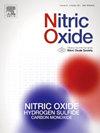Nitric oxide and mitochondrial function in cardiovascular diseases
IF 3.2
2区 生物学
Q2 BIOCHEMISTRY & MOLECULAR BIOLOGY
引用次数: 0
Abstract
Nitric oxide (NO) has been highlighted as an important factor in cardiovascular system. As a signaling molecule in the cardiovascular system, NO can relax blood vessels, lower blood pressure, and prevent platelet aggregation. Mitochondria serve as a central hub for cellular metabolism and intracellular signaling, and their dysfunction can lead to a variety of diseases. Accumulating evidence suggests that NO can act as a regulator of mitochondria, affecting mitochondrial function and cellular activity, which in turn mediates the onset and progression of disease. However, there is a lack of comprehensive understanding of how NO regulates mitochondrial function in the cardiovascular system. This review aims to summarize the regulation of mitochondrial function by nitric oxide in cardiovascular related diseases, as well as the multifaceted and complex roles of NO in the cardiovascular system. Understanding the mechanism of NO mediated mitochondrial function can provide new insights for the prevention and treatment of cardiovascular diseases.
心血管疾病中的一氧化氮和线粒体功能
一氧化氮(NO)被认为是心血管系统的一个重要因素。作为心血管系统的信号分子,一氧化氮可以放松血管、降低血压和防止血小板聚集。线粒体是细胞新陈代谢和细胞内信号传导的中枢,其功能障碍可导致多种疾病。越来越多的证据表明,氮氧化物可作为线粒体的调节剂,影响线粒体功能和细胞活性,进而介导疾病的发生和发展。然而,人们对 NO 如何调节心血管系统线粒体功能还缺乏全面的了解。本综述旨在总结一氧化氮在心血管相关疾病中对线粒体功能的调控,以及一氧化氮在心血管系统中多方面的复杂作用。了解一氧化氮介导线粒体功能的机制可为预防和治疗心血管疾病提供新的见解。
本文章由计算机程序翻译,如有差异,请以英文原文为准。
求助全文
约1分钟内获得全文
求助全文
来源期刊

Nitric oxide : biology and chemistry
生物-生化与分子生物学
CiteScore
7.50
自引率
7.70%
发文量
74
审稿时长
52 days
期刊介绍:
Nitric Oxide includes original research, methodology papers and reviews relating to nitric oxide and other gasotransmitters such as hydrogen sulfide and carbon monoxide. Special emphasis is placed on the biological chemistry, physiology, pharmacology, enzymology and pathological significance of these molecules in human health and disease. The journal also accepts manuscripts relating to plant and microbial studies involving these molecules.
 求助内容:
求助内容: 应助结果提醒方式:
应助结果提醒方式:


